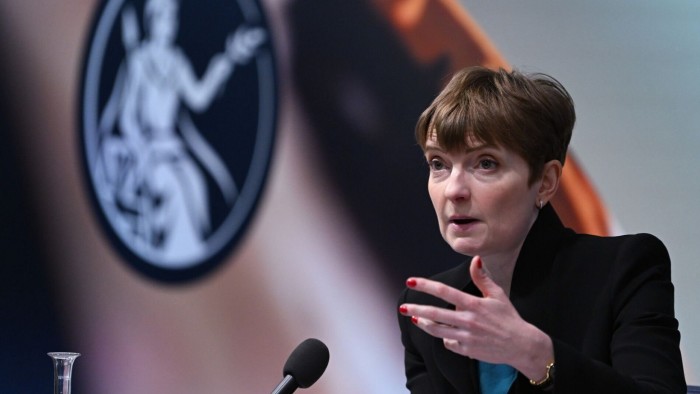Stay informed with free updates
Simply sign up to the UK inflation myFT Digest — delivered directly to your inbox.
UK inflation pressures should continue to weaken on the back of easing pay growth and Donald Trump’s trade war, a Bank of England rate-setter has said, but caution “remains appropriate” over the outlook for prices.
Clare Lombardelli said on Monday that forward-looking indicators suggested “substantial progress” on wage growth falling to be more in line with the central bank’s 2 per cent inflation target by the end of the year.
“However, caution remains appropriate. I’ll be more comfortable when I see material deceleration in the data over a longer period,” the deputy BoE governor told an audience at King’s Business School in London.
In the short term, Trump’s tariffs on imports to the US “and more uncertain US policies will likely reduce growth and inflation”, she added, “because of reduced demand and trade diversion from reduced exports by the rest of the world”.
Consumer price inflation stood at 2.6 per cent in March, according to data from the Office for National Statistics, while wage growth came in at 5.9 per cent in the three months to February.
Lombardelli said pay growth was “still too high” to be consistent with the 2 per cent inflation target, along with services price growth, which stood at 4.7 per cent in March
“The picture is not entirely reassuring, although we should expect this disinflation to be bumpy,” she added.
Lombardelli said she had been undecided between holding and lowering interest rates when the BoE’s Monetary Policy Committee met last week, although she voted in a three-way split for a quarter-point cut to 4.25 per cent.
But gradual progress on bringing inflation down and the fallout from Trump’s trade war had prompted her to side with the majority, she said, noting that stronger sterling had helped lower price growth of goods imported into the UK.
Welcoming a tariffs deal between the US and China, Lombardelli warned that in the longer term, “if global trade were to fragment, this would reduce output and productivity and would raise inflationary pressures”.
The UK last week clinched the first deal with the US since Trump started imposing high tariffs, agreeing cuts to punitive levies on car and steel exports, but failing to reverse a flat 10 per cent levy that applies to most goods.
The BoE’s interest rate cut last week marked the fourth reduction since summer 2024, but governor Andrew Bailey said after the MPC met that policymakers “must continue to respond carefully to evolving economic circumstances”.
Lombardelli, whose remit as deputy governor is monetary policy, noted that productivity growth had been “very low” in recent years, but that this had not been reflected in a substantial decline in wage growth.
While the BoE modelled two scenarios — one in which demand weakens more than expected, and the other in which “second-round” effects on inflation lead to more persistent price growth — they were not mutually exclusive, Lombardelli said.
“It would be perfectly reasonable to be concerned that productivity growth does not return to pre-Covid levels and also that demand may be more suppressed by trade policy uncertainty,” she added.
Source link









